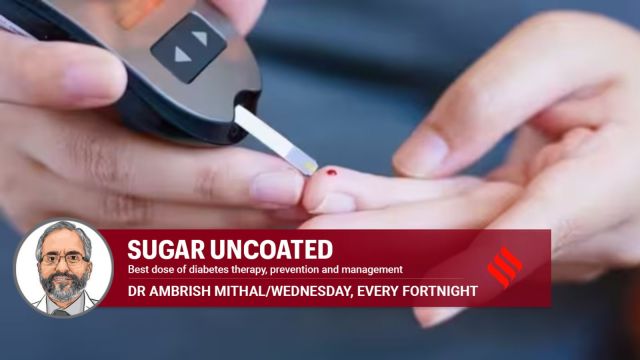Don’t be in diabetes denial, watch your diet, weight
Remember that you are not alone, almost 20 per cent of people at the age of 40 in Indian metros have diabetes. Denial of diabetes can only cost you, advises Dr Ambrish Mithal, Chairman of Endocrinology and Diabetes at Max Healthcare
 It is important not to deny the existence of diabetes, and rather face it head on. (File Photo)
It is important not to deny the existence of diabetes, and rather face it head on. (File Photo) “I don’t believe I have diabetes”, said the 42-year-old business executive across the table. “I feel absolutely fine and have no family history. I have been eating a lot of sweets during Diwali, that must be the reason for this high blood sugar.” He had a fasting blood sugar reading of 145 mg/dl. On repeat testing, the fasting was 138 mg/dl, and the HbA1c was 7.4 per cent. Both of these confirmed the diagnosis of diabetes, but the gentleman refused to accept it. “I may have a ‘borderline’ condition but I am not actually diabetic.”
This is not an uncommon scenario. The question is why would highly educated, aware individuals deny the existence of a condition that is so obvious? First, they often feel fine at the time of diagnosis though their numbers are abnormal. It requires a certain degree of mental discipline, especially for younger people in the prime of their careers, to accept that something could be wrong when they are feeling fine.
Second, the diagnosis of diabetes is almost always accompanied by a fear of life long restrictions on food and lifestyle. It can be tough for people to accept this. Often the feelings are misplaced as typical type 2 diabetes basically requires you to follow a healthy lifestyle, which you should be doing anyway. (Type 1 diabetes is different and not included in this article). An early diagnosis and intervention will help protect you from long-term health issues. At times, people with diabetes who are treated early in the course of their disease turn out to have a healthier and longer life than their non-diabetic counterparts.
Third, there is fear of organ complications — the kidneys, heart, eyes and feet, among others. The fear, particularly of kidney failure, leads to a kind of escapism and an ostrich-like approach where you feel the condition will go away if you deny its existence. But shutting your eyes to reality does not work! It’s much better to accept, follow simple principles and emerge a winner.
Fourth is the tendency of some people to take it very lightly- “I can manage it on my own, it is not a big deal.” While it is true that diabetes management basically depends on the patient, it is important to seek the right guidance and test regularly as advised.
Fifth is the feeling of guilt, the feeling that “I must have done something wrong which is why I am facing this.” A positive attitude is essential for leading a healthy life. Blaming yourself, or those around you, will not help.
Sixth is the stigma that some people, especially in the younger age group attach to the condition. They try to hide the condition from friends and colleagues for fear that they will be stigmatized and left out of fun and games that their peers enjoy.
There’s another type of denial too, that occurs later in the course of the disease. That is the denial of the need of lifestyle measures in the management, while accepting the medication and even insulin. Refusal to accept the relationship between what you eat, or how much you weigh, with your sugar control can be a severe impediment in managing diabetes. Some do not accept that their nerve or eye symptoms could be because of diabetes.
It is important not to deny the existence of diabetes, and rather face it head on. Remember that you are not alone, almost 20 per cent of people at the age of 40 in Indian metros have diabetes. By the time you are 60, this figure will increase to around 40 per cent. It is possible to deal with it and lead a healthy life. Trust your doctor, follow their advice.
While it is important to accept the existence of diabetes and the importance of management, don’t let it overwhelm you. Some of my patients develop an obsession about their condition, micro-managing the disease to a ridiculous extent, allowing it to take control of their lives. Remember, you manage your diabetes, don’t let diabetes manage you!
- 01
- 02
- 03
- 04
- 05






























